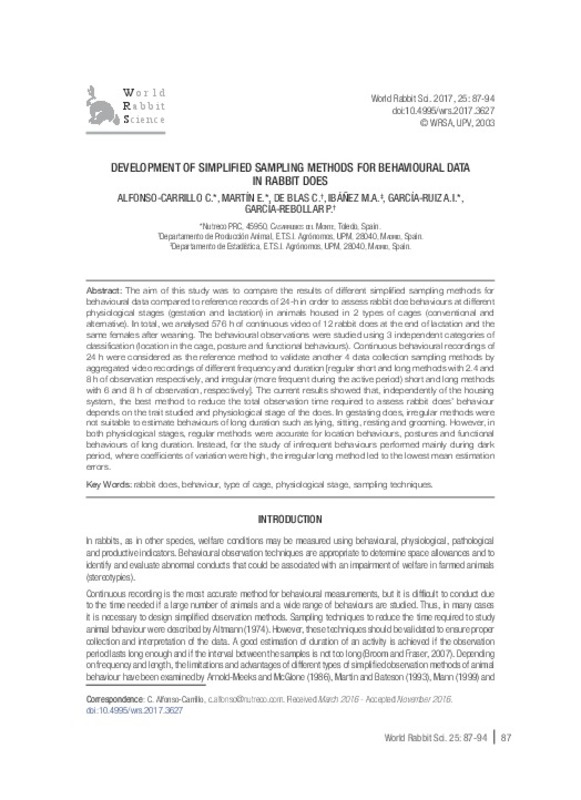JavaScript is disabled for your browser. Some features of this site may not work without it.
Buscar en RiuNet
Listar
Mi cuenta
Estadísticas
Ayuda RiuNet
Admin. UPV
Development of simplified sampling methods for behavioural data in rabbit does
Mostrar el registro sencillo del ítem
Ficheros en el ítem
| dc.contributor.author | Alfonso-Carrillo, C.
|
es_ES |
| dc.contributor.author | Martín, E.
|
es_ES |
| dc.contributor.author | Blas, Carlos de
|
es_ES |
| dc.contributor.author | Ibáñez, M.A.
|
es_ES |
| dc.contributor.author | García-Ruiz, A.I.
|
es_ES |
| dc.contributor.author | García-Rebollar, P.
|
es_ES |
| dc.date.accessioned | 2017-04-03T10:03:25Z | |
| dc.date.available | 2017-04-03T10:03:25Z | |
| dc.date.issued | 2017-03-30 | |
| dc.identifier.issn | 1257-5011 | |
| dc.identifier.uri | http://hdl.handle.net/10251/79353 | |
| dc.description.abstract | [EN] The aim of this study was to compare the results of different simplified sampling methods for behavioural data compared to reference records of 24-h in order to assess rabbit doe behaviours at different physiological stages (gestation and lactation) in animals housed in 2 types of cages (conventional and alternative). In total, we analysed 576 h of continuous video of 12 rabbit does at the end of lactation and the same females after weaning. The behavioural observations were studied using 3 independent categories of classification (location in the cage, posture and functional behaviours). Continuous behavioural recordings of 24 h were considered as the reference method to validate another 4 data collection sampling methods by aggregated video recordings of different frequency and duration [regular short and long methods with 2.4 and 8 h of observation respectively, and irregular (more frequent during the active period) short and long methods with 6 and 8 h of observation, respectively]. The current results showed that, independently of the housing system, the best method to reduce the total observation time required to assess rabbit does’ behaviour depends on the trait studied and physiological stage of the does. In gestating does, irregular methods were not suitable to estimate behaviours of long duration such as lying, sitting, resting and grooming. However, in both physiological stages, regular methods were accurate for location behaviours, postures and functional behaviours of long duration. Instead, for the study of infrequent behaviours performed mainly during dark period, where coefficients of variation were high, the irregular long method led to the lowest mean estimation errors. | es_ES |
| dc.language | Inglés | es_ES |
| dc.publisher | Universitat Politècnica de València | |
| dc.relation.ispartof | World Rabbit Science | |
| dc.rights | Reserva de todos los derechos | es_ES |
| dc.subject | Rabbit does | es_ES |
| dc.subject | Behaviour | es_ES |
| dc.subject | Type of cage | es_ES |
| dc.subject | Physiological stage | es_ES |
| dc.subject | Sampling techniques | es_ES |
| dc.title | Development of simplified sampling methods for behavioural data in rabbit does | es_ES |
| dc.type | Artículo | es_ES |
| dc.date.updated | 2017-04-03T09:51:58Z | |
| dc.identifier.doi | 10.4995/wrs.2017.3627 | |
| dc.rights.accessRights | Abierto | es_ES |
| dc.description.bibliographicCitation | Alfonso-Carrillo, C.; Martín, E.; Blas, CD.; Ibáñez, M.; García-Ruiz, A.; García-Rebollar, P. (2017). Development of simplified sampling methods for behavioural data in rabbit does. World Rabbit Science. 25(1):87-94. https://doi.org/10.4995/wrs.2017.3627 | es_ES |
| dc.description.accrualMethod | SWORD | es_ES |
| dc.relation.publisherversion | https://doi.org/10.4995/wrs.2017.3627 | es_ES |
| dc.description.upvformatpinicio | 87 | es_ES |
| dc.description.upvformatpfin | 94 | es_ES |
| dc.type.version | info:eu-repo/semantics/publishedVersion | es_ES |
| dc.description.volume | 25 | |
| dc.description.issue | 1 | |
| dc.identifier.eissn | 1989-8886 |








